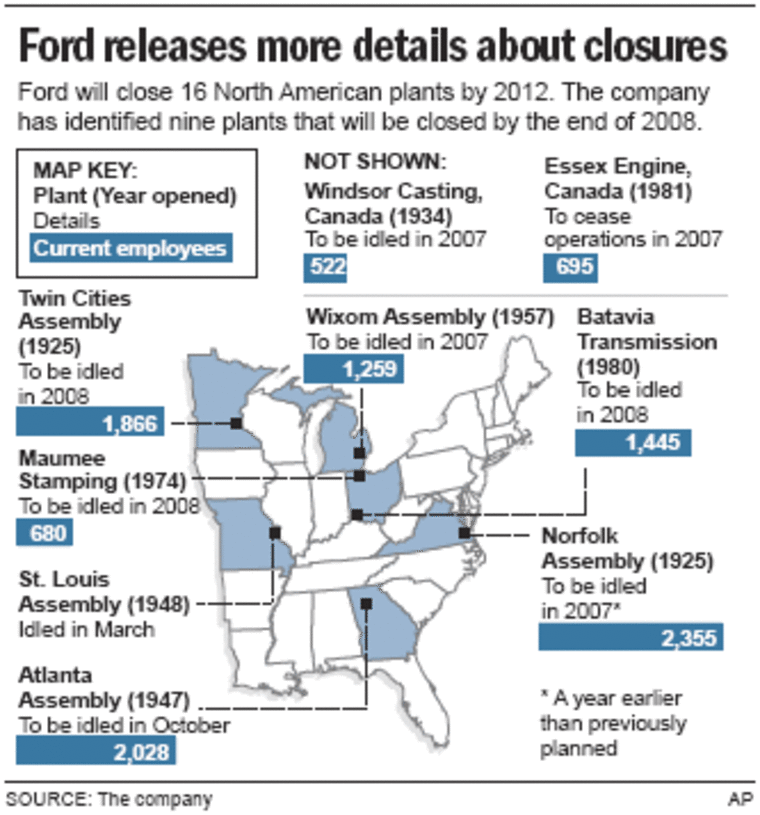Robert Liley uprooted his family for this Toledo suburb four years ago when Ford Motor Co. shut down an assembly plant in New Jersey. Now he’s facing another shutdown and moving again.
He just hopes the automaker offers him a job somewhere else. “I hope they do it — if there’s somewhere to go,” he said.
Whether he and Ford workers at 16 plants to be closed in the next two years will find jobs at the remaining factories depends on how many employees accept the company’s new buyout offer.
Ford announced Friday it is offering buyouts to all of its 75,000 U.S. hourly workers and shutting down Maumee in 2008 and an engine plant in Essex, Ontario, in 2007. In July, Ford said it would close 14 other plants.
It also plans to sell or close by the end of 2008 all facilities that it took back as part of a bailout of Visteon Corp., a supplier spun off from the automaker.
Under the buyout and early retirement plan, workers can choose among eight packages that offer from $35,000 to $140,000 depending on years of service, age and how close they are to retirement. Some packages will force workers to give up health benefits.
“A lot of the older guys can get a bonus for taking early retirement and keep their benefits and pension,” said Hank Dingus, a millwright at Ford’s transmission plant in Sharonville near Cincinnati. “If enough of them take it, that could leave jobs for the rest of us if we stay.”
Dingus, 31, said he can’t afford to lose health care, but he is still considering going to school full time under Ford programs that would pay some tuition but mean the end of his job.
Brad Jeppesen, who works at a St. Paul, Minn., plant slated to close in 2008, said he feels lucky that at 36, he’s young enough to find other work. About 1,700 workers there make the Ford Ranger.
“The people who’ve been there 25 years are going to have a lot harder time, people in their 50s,” said Jeppesen.
Yet many workers who have been with the company for a decade or less said they’d rather stay with the company than take a buyout.
“It’s really not enough money to walk after 11 years,” said Dean Maibert, who works at a truck plant in Wayne, Mich. “We’ll see what they put on the table for us.”
Workers who make F-150 pickup trucks dropped by the union hall in Norfolk, Va., to pick up what could be one of their last paychecks. Ford said Friday the assembly plant will close in 2007, a year earlier than expected.
Linda Gardner was angry about the buyout offer — particularly a provision that requires workers to pay for their own health insurance after the first six months.

“I may sound like I’m being selfish, but I don’t think one year’s pay with my medical benefits being taken out is worth all of this,” said Gardner, 39, who has worked at the plant for 11 years along with her husband. “It’s horrible. They’re not thinking about the younger workers.”
Still, she planned to take the buyout for fear that she would get nothing later if she waits, and she said she does not want to transfer to another plant and uproot her family.
Ford said the changes are needed to end financial losses and remake itself into a smaller, more competitive car company. It plans to complete its cuts of about 30,000 hourly jobs by the end of the 2008.
There was no celebration in Brook Park, a Cleveland suburb, even though the city’s three Ford plants are safe — for now.
“Morale is kind of low. There’s a lot of unknowns,” said Tim Levandusky, president of the United Auto Workers 1250. He said the union needs to work with Ford to turn around the industry and save it from the same fate as the steel industry.
“We all have a lot lose in this,” he said.
Ohio Gov. Bob Taft promised the state would help with job training and try to find a new buyer for the Sandusky operation.
The Maumee plant, which supplies Ford factories with bumpers and body panels, employs about 680 people who make $25 to $30 an hour.
Workers from the overnight shift sat shoulder to shoulder Friday morning at the bar in the “Break Room Lounge” down the street from the plant. They ended their work week with news most of them said they expected.
“I knew it was happening, but I wasn’t ready for it,” said Liley, 46, who worked six years at Ford’s assembly plant in Edison, N.J., before moving to Ohio.
What left workers puzzled was that the plant had a reputation within company of being one of the top performing stamping operations.
“I don’t know what else we could have done to keep it open,” said Mike Guthrie. “We’re not going to walk out with our heads down.”
Rocky Gillespie sat at a table drinking a beer with his wife who had a plate of scrambled eggs. Their 3-year-old son, Reis, munched on a bag of cheese curls.
“I could transfer, but if the economy doesn’t get better is there going to be anywhere to transfer to?” asked Gillespie, an 18-year Ford veteran.
He called his wife, Deborah, and woke her up with the news.
“I tried to go back to sleep, but I couldn’t,” she said. “It’s kind of surreal. You never think it could happen to you.”
